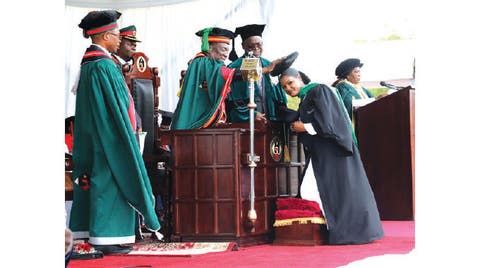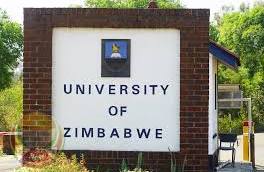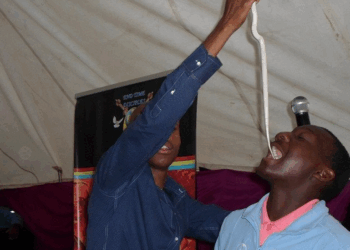PRESIDENT Mnangagwa yesterday capped 2 138 graduates at Lupane State University (LSU) during the institution’s 14th graduation ceremony at its main campus in the Matabeleland North provincial capital, Lupane.
Those who graduated were drawn from the Faculties of Agricultural Sciences, Commerce, and Humanities and Social Sciences.
The colourful ceremony began shortly after 11am when President Mnangagwa, who is the Chancellor of all State universities, led the academic procession into the arena where the graduands, their friends and relatives were waiting.
The Zimbabwe National Army brass band and the LSU choir entertained guests through their melodious renditions.
Out of the 2 138 students who graduated in various disciplines, 1 338 were females, which translates to 63 percent.
Among those who were capped were Chronicle Chief Photographer Eliah Saushoma who graduated with a Bachelor of Arts Honours degree in Film, Television and Media Studies and Zimpapers’ Bulawayo branch loss control officer, Sanele Nyanga, who graduated with a Bachelor of Social Science in Peace and Security Studies
Saushoma was also among those who excelled with a first class degree and for his efforts he was rewarded with a university book award.
In his address, LSU Vice Chancellor Professor Pardon Kuipa said the university remains one of the key centres of educational excellence in the country and regionally as evidenced by collaborations with universities from other countries on the African continent in various areas of partnerships.
“During this academic year, LSU joined 30 other universities in Africa to strengthen our Master of Social Science programme in climate change and sustainable development. The university shall continue to work with Government and business in ensuring that no one and no place is left behind as we develop our economy to an upper middle income status by 2030, brick by brick, stone upon stone,” he said.
“We wish to commend Government for availing financial resources to the university that allowed us to embark on a number of construction projects such as the Bingwa Ecotourism and Wildlife Innovation and Industrial Park.”
Prof Kuipa said the Australian Embassy through the Public Policy Research Institute donated solar equipment for the university’s library and computer laboratory.
“We also extend our appreciation to Old Mutual for partnering us to build a health services centre on our campus for both students and staff to access medical assistance.”
The centre has consulting rooms, working rooms, ablution facilities and observations rooms.
A solar power satellite system was also installed around the campus to improve lighting and security for the students.
“Your Excellency, following your election victory, you have urged all of us to work hard in order to accelerate the transformation of living standards of our people especially those living in rural communities. This call resonates well with LSU’s building communities through knowledge motto,” said Prof Kuipa.
“LSU shall continue to complement Government efforts to improve rural household livelihoods by creating innovation and offering more programmes that contribute directly to the improvement of rural livelihoods and rural development.”
Prof Kuipa said despite numerous challenges, the university made great strides in transforming rural lives through assisting local communities with agricultural extension technical services and drip irrigation.
“As LSU we have a goat rearing project at our Dryland Agro-Innovation Hub and Industrial Park. There is a growing goat industry in the country but there is no value addition to most goat skins as less than 20 percent of goat skins in Zimbabwe are processed,” he said.
Prof Kuipa said the goat skin leather process involves the use of several chemicals some of which have an adverse impact on the environment.
He said the leather industry is generally a heavily polluting industry as effluent produced by the chemicals has a significant negative impact on the environment and human health.
In light of that, Prof Kuipa said the university is undertaking research options for the goat skin leather process to reduce environmental risks.
“Your Excellency and Chancellor, we thank you for personally sponsoring this research programme to the tune of US$30 000.
“We thank you for your visionary leadership. The focal points to the goat skin to leather and research programme will be the reduction in water consumption, efficient use and substitution of potential harmful process agents and risk reduction within the process in conjunction with the recycling and reuse options,” he said.
Prof Kuipa said in 2023, LSU joined the Russian-Africa Network Invest Consortium which promotes education, scientific and technical co-operation among the consortium members.
He said LSU also signed agreements with a number of universities in Belarus under the auspices of the African Association ofUniversities.
Prof Kuipa said the university was recently granted a licence to operate a micro-finance company which will provide small loans to members of the public, students and staff.
He said the country needs to leverage on high skilled human resources in exploiting natural resources that the country has to compete at a global level.
Higher and Tertiary Education, Science and Technology Development Minister Professor Amon Murwira, his deputy Cde Simelisizwe Sibanda, Industry and Commerce Minister Dr Sithembiso Nyoni and Matabeleland North Provincial Affairs and Devolution Minister Richard Moyo, Vice Chancellors from other State universities and members of the LSU council were among the people that attended the graduation ceremony.












